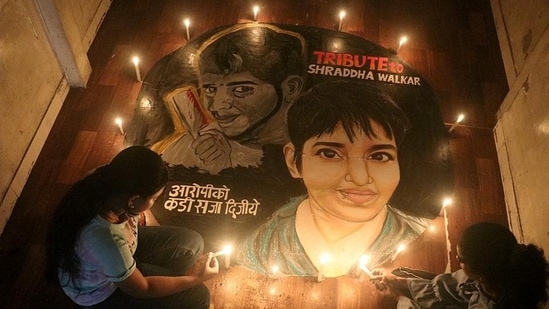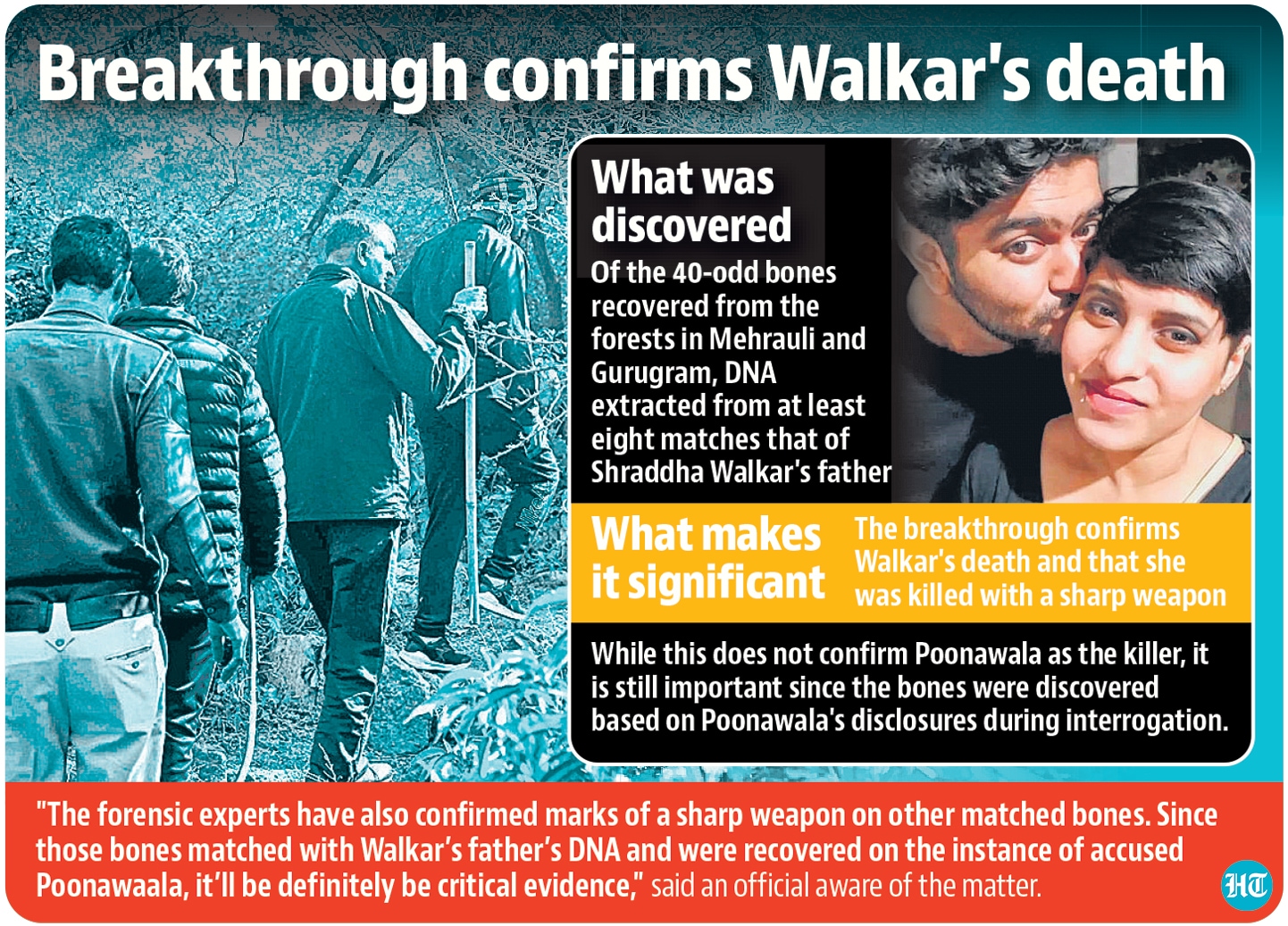Bones found in forest Walkar’s: DNA report
The DNA retrieved from bones found in south Delhi forests matched that of Shraddha Walkar’s father, Delhi Police officials said on Thursday, announcing a grim breakthrough that confirms the 27-year-old woman’s death and offers a significant piece of evidence that can nail her alleged killer, Aaftab Poonawala.
The DNA retrieved from bones found in south Delhi forests matched that of Shraddha Walkar’s father, Delhi Police officials said on Thursday, announcing a grim breakthrough that confirms the 27-year-old woman’s death and offers a significant piece of evidence that can nail her alleged killer, Aaftab Poonawala.

An official aware of the investigation said that out of 40-odd bones recovered from the forests of Mehrauli and Gurugram, DNA extracted from at least eight matched with the DNA of Walkar’s father.
Sagar Preet Hooda, the special commissioner of police (law and order, zone-2), said that the police received DNA reports from Central Forensic Sciences Laboratory (CFSL) in Lodhi Road on Wednesday. “The report will be helpful for us in investigation. We have also received the polygraph test report of accused Aaftab Poonawala from FSL, Rohini. This report will also be important in the investigation of this case,” he said.

“Most importantly, the pelvic bone – an attachment of the lower limbs found with the sacrum, which is a shield-shaped bony structure located at the base of the lumbar vertebrae – has matched with the DNA of Walkar’s father. The DNA matching of pelvic bone, which was recovered on Poonawala’s instance, confirms the death now,” said the first official cited above, who asked not to be named.
“The forensic experts have also confirmed marks of a sharp weapon on other matched bones. Since those bones matched with Walkar’s father’s DNA and were recovered on the instance of accused Poonawaala, it’ll be definitely be a critical evidence for the police in this case,” said the officer.
The clues are crucial since there were no eyewitnesses, the weapons found at the crime scene are yet to be linked with the crime. It is Poonawala’s words during custodial interrogation that the police have relied on to piece the case together, but such disclosures are not admissible as evidence in court unless made as a confession in front of a magistrate.
The second official added that the pending forensic reports of the polygraph test could also help police in investigating the case. “Poonawala had given vital links of the case during his polygraph test. We’ll definitely explore the information shared by him during the polygraph, to connect the missing links in this case,” he said.
In addition to the missing murder weapon, Walkar’s phone, too, has not been found. “The forensic report of Poonawala’s narco-test is yet to come, which can give a major breakthrough in the psycho-analysis of the accused in a subconscious stage.”
A person’s genetics is almost evenly split with DNA patterns from their parents, which makes the match with what was retrieved from the bones with that of Walkar’s father as the most convincing evidence. “(But) one shouldn’t forget that Walkar’s murder has been confirmed today, but we’ve yet to ascertain the accused as killer,” the officer quoted above added.
“The investigation has now reached to a very decisive point as the [DNA from the] bones recovered on Poonawala’s instance have matched with Walkar’s father’s. This scientific and medico-legal evidence is acceptable in any court of law and it will be impossible for Poonawala’s lawyer to challenge its authenticity. To ensure conviction of the accused in this case, Delhi Police, which is one of the most professional police forces in the world, must leave no stone unturned to recover the weapon used in commission of crime. If the phone of the deceased has been destroyed, the police must have gathered all the data of that phone from the service provider concerned,” said Vikram Singh, retired IPS officer and the former police chief of Uttar Pradesh.
Vikas Walkar urged the authorities to fast-track the trial and asked for Poonawala to be given the death penalty, recounting his conversation with the Maharashtra deputy chief minister Devendra Fadnavis last week. “I also asked the government to look into his (Poonawala’s) family and into why my complaints were not dealt with adequately,” he said in an interview to News18, referring to the first time he alerted police about his missing daughter.
Thursday’s breakthrough comes almost exactly a month after Walkar’s murder first came to light with dreadful details. In the time since, people who knew the couple have come forward and sketched a tale of physical and emotional abuse at the hands of her live-in partner, which ended with her death on May 18.
Once he allegedly killed her, Poonawala, according to what he told police, went about a surgical plan to get rid of Walkar’s body by chopping it into 35 pieces and scattering the remains over several city forests – a tactic that helped the crime remain undetected for six months.
Poonawala is in judicial custody at present.
Investigators and forensics experts have pored over the couple’s flat and several spots in south Delhi that Poonawala led them to. Among pieces of clues taken in for analysis are the bones recovered from the forests, traces of blood found in the kitchen, bathroom and bedroom, a knife, clothes, Poonawala’s phone and a laptop.
Poonawala has also undergone a polygraph and narcoanalysis test. The disclosures from these are will not qualify as prosecutable evidence but they will help investigators find any more details that the suspect could be hiding from them.






